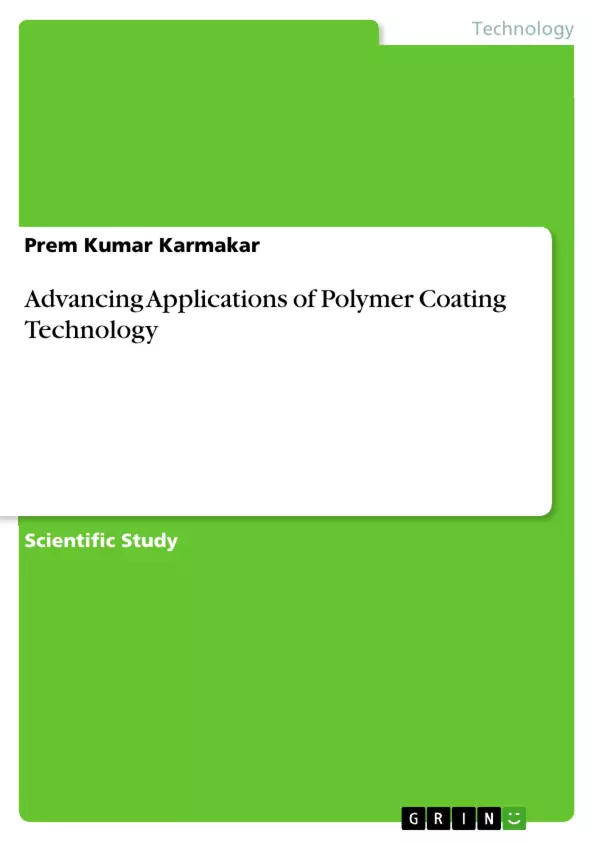Research conducted over the past few decades has brought us closer to the development of functional polymer coatings that are easy to use, self-cleaning, antibacterial, and antifouling. The use of polymer coatings has little or no impact on other properties, and they do not compromise the safety or mechanical strength of the materials being coated. Coatings are highly durable, resistant, and are primarily used for protection against environmental factors such as water, corrosion, and other elements. These coatings must meet stringent performance requirements to ensure maximum effectiveness.
In this work, we try to bring forward the recent research and advancements that are taking place in the field of Polymer Coating Technology, and have a better understanding of this technology getting implemented in our day-to-day life.
Inhaltsverzeichnis (Table of Contents)
- Abstract
- Introduction
- Literature Review
- Industrial Demand for Polymer Coatings
- Methods
- Research
- Advanced functional coatings
- In biomedicine, functional coatings have been explored for their use in tissue engineering, drug delivery, and implantable medical devices.
- Smart coatings
- For instance, a research team from the University of Bath developed a smart polymer coating that can be used to prevent the adhesion of bacteria to medical devices, such as catheters and implants.
- Biodegradable coatings
- Research is ongoing to improve the properties of biodegradable polymer coatings and make them more suitable for various applications.
- Nanocoatings
- One area of current research in nano coatings is the development of self-healing coatings.
- Another area of research is the use of nano coatings for biomedical applications.
- In the field of electronics, researchers are exploring the use of nano coatings to improve the performance and durability of electronic devices.
- Multifunctional coatings
- One area of research involves the development of nanocomposite coatings, which combine nanoparticles with polymers or other materials to create multifunctional coatings.
- Another area of research is the use of bio-inspired coatings that mimic natural systems, such as lotus leaves, to provide self-cleaning and anti-fouling properties.
- Researchers are also exploring the use of coatings with stimuli-responsive properties that can change in response to external stimuli, such as pH or temperature.
- Coatings for medical devices
- The biocompatibility of devices can be enhanced by developing coatings that prevent or reduce the formation of blood clots, fibrosis, and inflammation.
- Functional coatings for medical devices are also being developed to improve their performance.
- Nanocoatings are also being explored for their potential in medical devices.
- Coatings for renewable energy applications
Zielsetzung und Themenschwerpunkte (Objectives and Key Themes)
This research paper aims to provide a comprehensive overview of the recent advancements in polymer coating technology, exploring its applications across various industries. The paper focuses on the increasing demand for polymer coatings, driven by factors such as corrosion control, surface protection, and the need for sustainable and functional materials. The paper also examines the diverse functionalities of polymer coatings, including self-cleaning, antibacterial, and controlled drug release properties.
- Advancements in polymer coating technology
- Applications of polymer coatings in diverse industries
- Increasing demand for polymer coatings
- Functional properties of polymer coatings
- Sustainability and environmental impact of polymer coatings
Zusammenfassung der Kapitel (Chapter Summaries)
- Abstract: Provides a brief overview of the research paper, highlighting the development of functional polymer coatings and their widespread applications.
- Introduction: Introduces the concept of polymer coatings, outlining their composition and advantages in various industries, including medicine.
- Literature Review: Discusses the diverse applications of polymer coatings, including their effectiveness in controlling corrosion in metals and their use as pharmaceutical excipients.
- Industrial Demand for Polymer Coatings: Examines the growing global market for coatings, with particular focus on the Asia Pacific and European regions. It highlights the factors driving market growth, including increasing demand for automotive, electronic, and industrial coatings.
- Methods: Explores the preparation methods for polymeric coatings, including the use of solvents, fillers, and additives to impart desired properties such as hardness, flexibility, and weather protection.
- Research: Delves into the current research trends in polymer coating technology, highlighting advancements in areas like advanced functional coatings, smart coatings, biodegradable coatings, nanocoatings, and multifunctional coatings.
- Coatings for Medical Devices: Discusses the application of polymer coatings in medical devices, focusing on improving biocompatibility, reducing infection risks, and enhancing functionality.
- Coatings for Renewable Energy Applications: Explores the use of polymer coatings in renewable energy systems, particularly in solar panels and wind turbines, to enhance performance and durability.
Schlüsselwörter (Keywords)
The primary keywords and focus topics of this research paper include polymer coatings, functional coatings, corrosion protection, drug delivery systems, sustainable materials, nanocoatings, biocompatible materials, renewable energy applications, and advanced coating technologies.
- Quote paper
- Prem Kumar Karmakar (Author), 2024, Advancing Applications of Polymer Coating Technology, Munich, GRIN Verlag, https://www.grin.com/document/1488887



